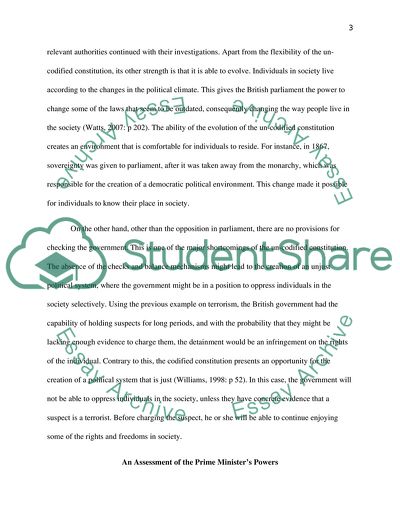Cite this document
(Virtues and Shortcomings of Britains un-codified Constitution Essay Example | Topics and Well Written Essays - 1750 words, n.d.)
Virtues and Shortcomings of Britains un-codified Constitution Essay Example | Topics and Well Written Essays - 1750 words. https://studentshare.org/history/1802985-critically-assess-the-virtues-and-shortcomings-of-britains-un-codified-constitution-critically-assess-the-prime-ministers-powers-review-the-role-of-the-media-in-british-politics
Virtues and Shortcomings of Britains un-codified Constitution Essay Example | Topics and Well Written Essays - 1750 words. https://studentshare.org/history/1802985-critically-assess-the-virtues-and-shortcomings-of-britains-un-codified-constitution-critically-assess-the-prime-ministers-powers-review-the-role-of-the-media-in-british-politics
(Virtues and Shortcomings of Britains Un-Codified Constitution Essay Example | Topics and Well Written Essays - 1750 Words)
Virtues and Shortcomings of Britains Un-Codified Constitution Essay Example | Topics and Well Written Essays - 1750 Words. https://studentshare.org/history/1802985-critically-assess-the-virtues-and-shortcomings-of-britains-un-codified-constitution-critically-assess-the-prime-ministers-powers-review-the-role-of-the-media-in-british-politics.
Virtues and Shortcomings of Britains Un-Codified Constitution Essay Example | Topics and Well Written Essays - 1750 Words. https://studentshare.org/history/1802985-critically-assess-the-virtues-and-shortcomings-of-britains-un-codified-constitution-critically-assess-the-prime-ministers-powers-review-the-role-of-the-media-in-british-politics.
“Virtues and Shortcomings of Britains Un-Codified Constitution Essay Example | Topics and Well Written Essays - 1750 Words”. https://studentshare.org/history/1802985-critically-assess-the-virtues-and-shortcomings-of-britains-un-codified-constitution-critically-assess-the-prime-ministers-powers-review-the-role-of-the-media-in-british-politics.


